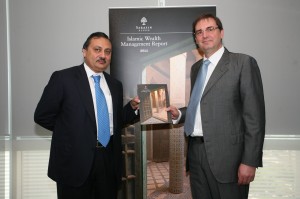 In its second annual Islamic Wealth Management Report, Bank Sarasin urges the Islamic banking community to take a stronger focus on Islamic Financial Planning. Bank Sarasin also calls for the industry to move forward by developing the Sharia framework, diversifying products and differentiating its offerings. Islamic Financial Planning, a religious obligation requested in the Qu’ran, involves the acquisition, preservation and philanthropic distribution of wealth. It is a religious duty that Muslims must have a will, so proper Estate Planning is required, often including a trust structure.
In its second annual Islamic Wealth Management Report, Bank Sarasin urges the Islamic banking community to take a stronger focus on Islamic Financial Planning. Bank Sarasin also calls for the industry to move forward by developing the Sharia framework, diversifying products and differentiating its offerings. Islamic Financial Planning, a religious obligation requested in the Qu’ran, involves the acquisition, preservation and philanthropic distribution of wealth. It is a religious duty that Muslims must have a will, so proper Estate Planning is required, often including a trust structure.
Bank Sarasin’s Islamic Wealth Report 2011 provides investors with an in-depth overview of developments in the Islamic Wealth arena in 2010 and explains how best to manage assets according to religious requirements. This approach exemplifies Bank Sarasin’s aim to minimise risk and maximise opportunities for its clients, a key objective in today’s volatile markets. This year’s Report opens by explaining the required approach to Islamic Financial Planning before focusing on the key areas of philanthropy, the family office service, mutual funds and Sukuk, before concluding with an insight into Bank Sarasin’s current economic outlook for 2011. The Report also notes that the Islamic requirement to distribute part of acquired wealth is driving philanthropic giving in the GCC region (Kuwait, Saudi Arabia, UAE, Qatar, Bahrain, and Oman). Annual philanthropic giving in the GCC is already estimated at as much as USD 50 billion.
Fares Mourad, Head of Islamic Finance, Bank Sarasin & Co. Ltd
“Islamic Financial Planning is largely neglected by the Islamic banking industry. It requires a detailed process, as well as structures and products to ensure Muslim investors are fully compliant with Sharia law. We are proud to have extended our holistic approach to offer a comprehensive Islamic wealth management service.â€
The key challenges and opportunities addressed in the Report are:
- Managing the Islamic wealth cycle through the entire process of wealth acquisition, preservation and distribution and achieving the required balance between spiritual and worldly obligations.
- Understanding the primary issues facing Waqf donors despite the strong growth drivers in this market: poor performance is due in part to the shortage of professionals leading to low quality asset management and lack of transparency.
- Considering the suitability of the Swiss private banking family office structure as a wealth management tool to ensure effective Islamic governance.
- Addressing the challenges facing Islamic mutual funds to achieve growth and performance.
- Recommending standardisation, education and diversification of Sukuk in order to increase the supply of products and the liquidity of the market.
- Analysing Islamic equity and indices performance over the last year to illustrate that diversification remains key for investment without compromising Islamic principles.
In November 2009, the Sarasin Group introduced a comprehensive Islamic wealth management service offering the full spectrum of Sharia-compliant private banking products and services: estate and succession planning, financing and asset management, including money market and structured products such as Wakala, Murabaha and Maraya. To support this service, a dedicated department with high level expertise and a renowned Sharia Board ensure the high quality service that clients have come to expect. The Sarasin Group has created a tailored service that enables its Islamic clients to have the forward-planning tools, processes and products necessary to ensure that they are meeting their obligations under Islamic law.
The Islamic Wealth Management Report 2011 is available for download on www.sarasin.com.




































